LCMS-8050
Analysis of Residual Pesticides in Foods, etc. Using
LCMS-8050 Systems

Japan Food Research Laboratories
-
INDUSTRY
Food and Beverages, Small Molecule Pharmaceutical
-
KEYWORD
-
INTRODUCTION SERVICE&PRODUCTS
LCMS-8050
We asked Eisuke Toriumi, Fumiko Watanabe, Mao Koga, and Kazuhiko Ogura of the Japan Food Research Laboratories (JFRL) about using their new triple quadrupole LCMS-8050 system for residual pesticide analysis.
During the interview, we also asked about the various pesticide analyses they perform, the reasons for choosing the Shimadzu system for those applications, their impressions of using the Shimadzu system, and what they would like from Shimadzu in the future.
Customer
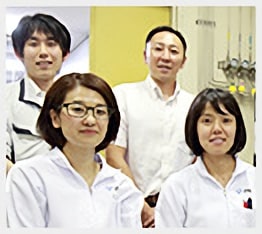
Chief, Fumiko Watanabe (bottom right)
Mao Koga (bottom left)
Kazuhiko Ogura (top left)
Section of Testing Agricultural Chemicals, Department of Trace Testing,
*Affiliates and titles of the interviewee are current as of the time of reporting.
Japan Food Research Laboratories
URL
http://www.jfrl.or.jp/e/index.html
Interview
The JFRL website indicates an extremely wide variety of contract testing areas.
What type of contract testing is your group, the Pesticide Testing Section, involved in?
Our main work involves measuring residual pesticides, primarily in food products. We also test some environmental samples, such as animal feed, soil, and water samples.
We perform both simultaneous analysis of several hundred pesticide components, which has become our main work, and analysis of specifically targeted components.
Fundamentally, we are involved in quantitative analysis. Therefore, we generally use simultaneous analysis as a means of quantifying a large number of components at the same time, rather than as a screening method.
What type of analysis is typically requested by your customers?
We receive a wide variety of requests, depending on how the customer intends to use the test results. For example, if a sample is suspected of containing pesticide residues, customers generally require test results very urgently. For such requests, we try to form a team that can provide test results as quickly as possible. In contrast, if testing is being performed for research, a survey, or for periodic quality control, customers often want the testing cost to be as low as possible. In such cases, we can offer a customized menu of testing services. We try to accommodate the various requests from customers as much as possible. However, regardless of the type of request, we always provide accurate results backed by strict routine internal accuracy controls. That minimum commitment is rooted in the core principles of our entire organization.
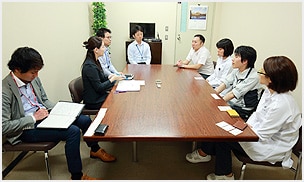
With such a wide variety of samples, analyses, and customer requirements, what sort of analysis does testing involve?
In general, most testing conforms to test methods specified for respective pesticides by the government. In addition, we often use modified versions of those methods for data already validated by JFRL. Though analytical instrument specifications are improving, they still usually require pretreatment and purification processes in order to measure residual pesticides properly. For example, water samples do not require significant purification, but food samples require several purification steps. Consequently, the purification and pretreatment processes can vary significantly depending on the sample, and extract solutions can almost never be measured directly in the instruments. We always perform several purification steps to make sure we obtain proper results. The person assigned to a particular analysis performs everything from pretreatment to instrumental analysis. They often prepare a sample solution by pretreating the sample during the day and then analyze that solution later in the evening. That can involve a variety of instruments, depending on the testing requirements involved.
What types of analytical instruments do you use?

We use a full range of chromatography-related instruments, such as HPLC, GC, LC-MS, and GC-MS systems. Of those, the most frequently used system is the LC-MS/MS system. Considering selectivity, we tend to try measuring samples with a mass spectrometer first, not only to analyze existing pesticides, but also for pesticides to be newly analyzed. In terms of mass spectrometers, we started out operating a GC-MS system, but most of the components we measured using the GC-MS system were eventually measurable by LC-MS. I think that is why the adoption rate of GC-MS/MS and LC-MS/MS has been so extremely high, because in addition to high selectivity, a single measurement can be used for both qualitative and quantitative analysis. We operate GC-MS and GC-MS/MS systems every day, in the same manner as other models, but we use LC-MS and LC-MS/MS systems to analyze an increasing number of targeted pesticides.
To avoid not being able to analyze a particular item because of a problem encountered with a single method available for analyzing that item, we make sure each item can be analyzed using at least two different instruments. Therefore, though we generally specify a particular instrument for analysis, we also specify conditions that allow the item to be analyzed using a different instrument. Particularly for simultaneous analysis, analytical conditions are always prepared for multiple instruments.
With so much analysis accomplished using mass spectrometers, have you mostly stopped using HPLC and GC systems?
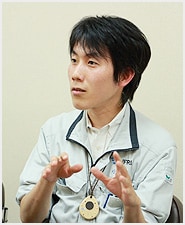
Not really. Our GC system has the next highest usage rates after the LC-MS/MS system. The major pesticides, such as organochlorines and organophosphates, are rarely analyzed by mass spectrometers, because GC provides more than adequate selectivity and sensitivity. Due to the high persistence of chlorinated pesticides, customers still commonly ask us to analyze them, though less than in the past.
GC and HPLC detectors sometimes offer better selectivity and sensitivity for other components as well, so we still use them in cases where mass spectrometers are not necessary. We use mass spectrometers for multi-component analysis, but we still use GC and HPLC systems frequently to analyze specific target components.
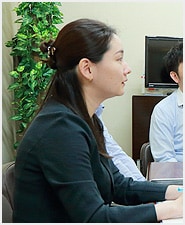
In other words, you select the optimal instrument depending on the pesticide components being analyzed, right?
You mentioned that your LC-MS/MS system has the highest usage rate, but as the frequency of use has increased, what instrument performance requirements have you had?
Selectivity and, not surprisingly, sensitivity are especially important. Pretreatment is still required for trace analysis of residual pesticides. However, if the instrument provides sufficient sensitivity, then samples can be analyzed with simple pretreatment by adequately diluting the samples, which requires less work and less overall analysis time. Higher sensitivity is more helpful for minimizing purification operations.
Software ease-of-operation is also important. In addition to simultaneous multi-component analysis, we also analyze pesticides individually if they are difficult to analyze simultaneously. That often involves considering various alternative conditions, such as mobile phases specialized for certain pesticides or samples, which requires acquisition and analysis conditions on a case-by-case basis. Routine analysis of multiple components can be accomplished using simple operations, but software operations can be very time-consuming if analytical conditions are frequently changed. Therefore, I would appreciate it if the software could be made a little easier to operate for preparing conditions or making slight adjustments to data analysis operations.
Considering you were already operating several LC-MS/MS systems when you purchased your first Shimadzu LC-MS/MS system, would you tell us the reasons behind selecting the LCMS-8050 model?
When we compared similar systems from different manufacturers, we felt there was not a big difference in sensitivity. The cost became a significant reason for selection. That was a factor that favored Shimadzu. However, the most important factor was Shimadzu's solid support capabilities. Our impression is that Shimadzu offers an extremely well developed support system, not only for periodic support requirements, but also for day-to-day support. Knowing that Shimadzu would handle any problem that might arise was a major deciding factor. It gives us the confidence that we can continue using the system without interruption. Since we introduced three systems at the same time, even though they were installed in different sections, it was also an advantage that the parts and support required during the initial delivery stage could be used for all three systems.

Ease of maintenance was also indicated as a selection criterion. Removing parts during maintenance of non-Shimadzu systems can be troublesome due to difficulty loosening the parts or their heavy weight. Therefore, during the selection process we checked the ease of maintaining the LCMS-8050. We were impressed with the simplicity of maintenance.
Also, the fact that we already had a history of using Shimadzu HPLC systems was a big factor. The delivery pump in the Shimadzu fluorescence detector and UV detector we currently use offers dramatically superior performance in comparison to other brands. Some of the other brands require replacing consumables frequently, but Shimadzu systems can be operated reliably without maintenance. When carryover was checked during the selection process, there was practically no carryover at all compared to competing products. The rinsing mechanism and injection system were also far superior.
Thank you. Now that it has been a half-year since the system was introduced, how do you like actually operating the system?
Instrument sensitivity is about what we expected, though it also depends on the pesticide component. In comparison to other non-Shimadzu LC-MS/MS systems we still operate, each brand differs in their ability to analyze different components. For samples that allow only limited purification, samples must be injected with high contaminant component levels. Consequently, some instruments have required maintenance two or three times in the last six months. However, the LCMS-8050 has continued to operate without any drop or fluctuations in sensitivity and with only minimal maintenance after installation. From optimizing settings to actually measuring samples, we are also impressed with how little time is required when preparing analytical conditions. The system operates smoothly for routine analysis of multiple components, but we hope Shimadzu makes improvements that lessen the trouble required to make slight adjustments when reviewing individual condition settings or when analyzing data.
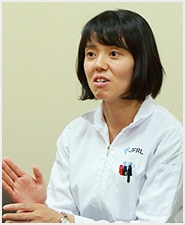
The Shimadzu system does not show the internal settings involved when preparing analytical conditions. That means information remains hidden when checking MS spectra, such as when trying to check noise ratios for difficult components or check for the presence of dimers. It would be great if improvements could be made to these areas. I think the fact that we can simply place a sample solution and wait for the system to prepare the analytical conditions is great for ease-of-use, but though we don't need to rely on the MS spectrum library very much because we rarely perform qualitative analysis, it would be nice if we could use that functionality to check newly prepared analytical conditions or to check conditions when transferring conditions prepared using another system to a different one.
Thank you for sharing your valuable opinions.
Do you have any other requests for Shimadzu, not necessarily regarding the LCMS-8050?
Shimadzu has consistently provided excellent day-to-day support for other Shimadzu products we use, such as HPLC systems, so we ask that you provide equally good support if it is needed for the LCMS-8050 system as well. Since mass spectrometers, including parts, tend to deteriorate after one or two years of operation, we would be extremely grateful for reliable support at that time. We would prefer to be taught how to perform maintenance and other procedures ourselves, but high-sensitivity models involve many areas that are inaccessible to us. Consequently, we have no choice but to ask the manufacturer for service and take everything on faith. We would appreciate it if you could take that fact into consideration. With TOF/MS and other new non-quadrupole models being introduced in recent years, we hope you will keep us informed of any new product introductions in the future, even though we probably cannot afford them anytime soon.

From the perspective of an administrator, we would like systems that can be used for five or ten years without any change in sensitivity or specifications. Though the performance of new models improves each year, it is important that once a system is purchased, it maintains the same status after several years. Another concern, though not specifically about Shimadzu, is that computer performance gradually cannot keep up with analytical instruments. Improvements in that area would be helpful.
We would also appreciate, by taking a different perspective, the ability to automate processes that currently cannot be automated. The current process flow, including standard solution preparation and pretreatment steps, still includes many manual steps.
Thank you for sharing your opinions.
We will strive to satisfy your expectations for supporting the LCMS-8050 system.
We will carefully consider your other comments as well.

Thank for providing your valuable time with us today.
Comments About the Interview
Japan Food Research Laboratories is a highly respected analytical institution, particularly in the field of residual pesticide analysis. This interview has reminded us of their extensive experience and wealth of technology for everything from pretreatment to sample analysis, and the large number and wide variety of analytical instruments they operate. In this interview, we received many valuable comments about the LCMS-8050 system. We hope to incorporate their suggested improvements in future development work. We intend to offer the same reliable support that earned their satisfaction with the HPLC systems for the LC-MS/MS system as well.

LCMS-8050 Liquid Chromatograph Mass Spectrometer




